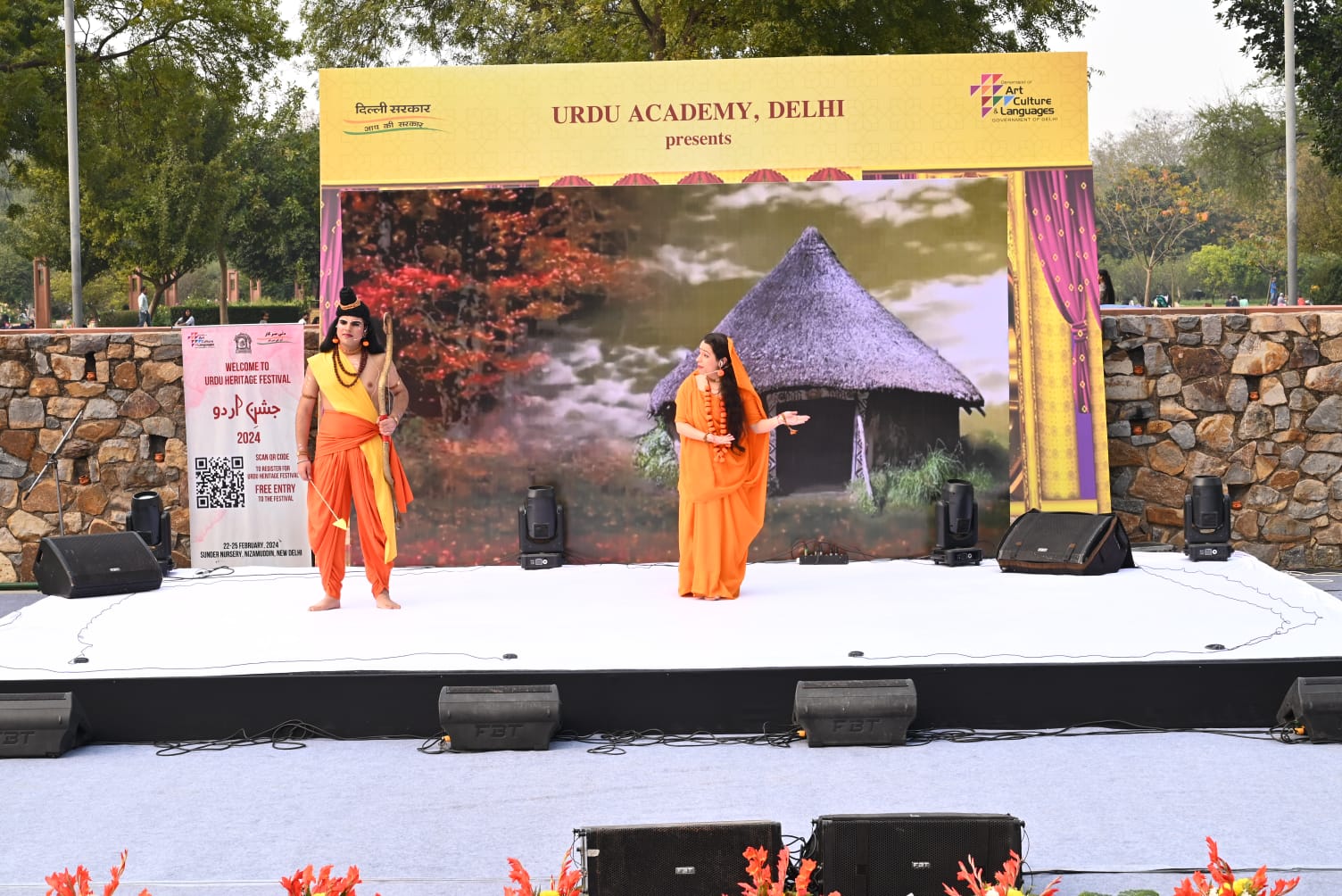
PERFORMANCE: A scene from the Ramleela being performed at the Urdu Heritage Festival at Sunder Nursery
Delhiites may have witnessed Ramleela many times in the past, but what took centre-stage this time was the Urdu language and it came out as a surprise for all.
A white tent was erected by the management at the Sunder Nursery venue during the Urdu Heritage Festival, and all the artists of Ramleela were seen rehearsing their dialogues. The director of the play, Anil Chawla, helped them out, ensuring that they don’t forget any Urdu dialogue or poetry lines.
“My artists have been doing this in Urdu for the last 16 years. I am sure they wouldn’t forget any dialogue but the last moment rehearsal is important,” Chawla said before the play involving the 15 artists started.
They have been practicing Urdu poetry, difficult words, Hindi dialogues and then merging of dialogues with musical notes.
While monitoring their rehearsal, Chawla said that the public would be amused by Ramleela in Urdu.
“Urdu is a sweet language and it belongs to everyone. It is us humans who have created this divide, saying that Urdu is only for Muslims and Hindi belongs only to Hindus. There is nothing like that,” he said.
The aim of performing this play in Urdu, he said, was to give everyone a message of brotherhood and equality.
“I believe that all religions are equal. People from different religions came to see our play, which carried out a message of brotherhood and harmony. They were happy to see it in Urdu as it added life to it,” said Chawla.
Chawla further added that Urdu Ramleela’s history dates back to 1976 when this script was handed by writer Tek Chand to fellow writer Nand Lal Batra.
“I received this script in 2008 from Nand Lal Batra Ji. It had a mixture of Hindi and Urdu dialogues. I was happy to read it and decided to perform it. In the past, Ramleela used to be performed in Hindi but for the last 16 years, we have been performing it in Urdu and Hindi. Both are our languages and we have to take them forward through such plays,” he added.
“Our families were refugees from Pakistan and before Partition, Ramleela used to happen in both the languages. We want this play to bridge linguistic divide and foster unity and inclusivity,” said Chawla who played the role of Lakshman for many years in the past.
About the popularity of the play, Chawla said, “We have done it in Prithvi Theatre Mumbai in 2017 and Rekhta Festival-2018 in Delhi. We are doing it here for the second time.
“Language should not be any barrier for an artist. He should perform in the language he is asked to. A language is a language, it doesn’t belong to any particular community. Urdu is such a sweet language and it gives you peace whenever you utter a word in it,” said Kunal Chawla, an artist who performed the role of Ram.
Narender Mohan Kapoor, 80, who played the role of Raavan’s grandfather said that he has been part of Ramleela since his childhood days.
“But since 2008, I have been doing it in Urdu and that is completely a different and great experience. Our ancestors used to perform it in Urdu and this organisation is working to taking this legacy forward,” he says.
“Urdu has added a new perspective to this play. Though we all are unpaid artists, it is the love for both the languages that made us do this play and we want this concept to be passed on to new generations,” said Sahib Kharbanda, an 11th-class student who played the role of Lakshman.
Dastaan-E-Ramayana: Ramleela in Urdu was performed by the Shradha Ramleela Committee, a Faridabad-based theatrical group at Sunder Nursery, New Delhi during the four-day Jashn-E-Urdu festival which concluded on February 25.
The event was organised by the Delhi government’s Urdu Academy in collaboration with its Art, Culture, Languages department.
The play was followed by a panel discussion themed, ‘Ramayana Urdu Ke Aaiine Mein.’
Urdu poet and critic Khalid Alvi, while speaking on the occasion, said that the British were the first to suggest that Urdu belongs to Muslims and Hindi to Hindus.
“But 400 years ago, during the Mughal rule, Persian was an official language. Hindi and Urdu were then commonly spoken called ‘Hindustani’. But a divide was created between both the languages,” he said.
Saurabh Bharadwaj, Minister of Art, Culture & languages said that they are working to introduce Urdu to the new generation. “Such events are giving us a boost,” he said.
From Old Delhi rooftops to elegant dining spaces, these five Delhi spots offer authentic, comforting…
Delhi Police arrested a 22-year-old woman for allegedly supplying mule bank accounts to an interstate…
ED says its excise policy money laundering probe is independent and backed by credible evidence,…
Five people were arrested after an eight-day, 1,500-km manhunt, with police recovering Rs 15 lakh…
Delhi Kala Utsav will be held at Rabindra Bhawan, Mandi House, on February 28 and…
A couple from Dwarka was arrested in Greater Noida for allegedly duping buyers of Rs…